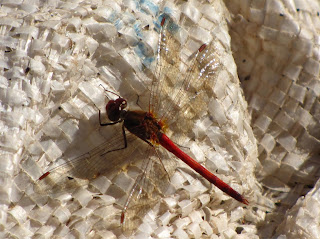NATURE MONCTON INFORMATION LINE, Oct. 23, 2017
(Monday)
To respond by e-mail, please address your message to the
information line editor nelson@nb.sympatico.ca
Please advise if any errors are noted in wording or photo
labeling.
For more information on Nature Moncton, check the website at
www.naturemoncton.com
Edited by: Nelson Poirier nelson@nb.sympatico.ca
Transcript by: David Christie maryspt@mac.com
Info Line # 506-384-6397 (384-NEWS)
** The HOUSE SPARROW [Moineau domestique] was at one time
very common in New Brunswick, but not anymore, and maybe the EASTERN BLUEBIRDS
[Merlebleu de l'Est] and TREE SWALLOWS [Hirondelle bicolore] are clapping their
wings. Jules Cormier had a male House Sparrow show up in his Memramcook yard on
Sunday and he thinks that it may be the first time that he has had one in his
yard in 40 years. Jules also had a WHITE-BREASTED NUTHATCH [Sittelle à poitrine
blanche] come by on Sunday.
** Ray Gauvin checked the Shepody area and the old mill road
for the CRESTED CARACARA [Caracara du Nord] on Sunday but it did not appear. I
dropped by that area in the morning and late in the afternoon and did not see it
either. Ray did get a photo of an AUTUMN MEADOWHAWK [Sympetrum tardif] there. It
seemed timid of him but kept returning to the same spot, appearing to want to
get its photo taken. Its yellow basal wing patches are quite typical of this
species and some other meadowhawks. Note the brown legs specific to Autumn
Meadowhawk.
** Aldo Dorio came across two GRAY JAYS [Mésangeai du
Canada] on Sunday. Two of the views give some detail of undertail pattern that appears different due the photo angle.
** There’s more material to show from the falconry trip on
Saturday. Brian Stone took two videos of Jamie Stride showing his SAKER FALCON
[Faucon sacre]. Note that one shows the bird’s head staying in the same
position, even though Jamie's hand is moving like a swaying branch, so that the
falcon’s eyes can stay focused on the same spot. Be sure to turn up the volume
to be able to hear Jamie’s comments.
** I recently drove by the pond in Lower Coverdale, where the two domestic BLACK-NECKED SWANS [Cygne à cou noir] have four cygnets. Two groups of CANADA GEESE [Bernache du Canada] were trying to enter the pond from different areas, but the swans were having nothing of it and were busy advising them in no uncertain terms that they were not welcome and to leave the area.
I’ve been noting the very abundant BAYBERRIES [myrique]
forming in coastal areas. These berries have a large seed covered with a lipid
which has been used in making scented candles but also gets some usage by
overwintering YELLOW-RUMPED WARBLERS [Paruline à croupion jaune] that use the
rich lipid as a food source, hence their older name of Myrtle Warbler, from the
older name of the plant.
Nelson Poirier,
Nature Moncton
AUTUMN MEADOWHAWK.OCT 22,2017.RAY GAUVIN
BAYBERRIES.OCT 21, 2017.NELSON POIRIER
BAYBERRIES.OCT 21, 2017.NELSON POIRIER
GRAY JAY OCT 22, 2017.ALDO DORIO
GRAY JAY OCT 22, 2017.ALDO DORIO
GRAY JAY OCT 22, 2017.ALDO DORIO
AUTUMN MEADOWHAWK.OCT 22,2017 .RAY GAUVIN






